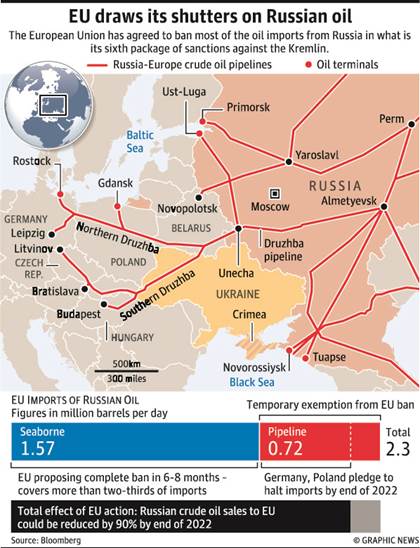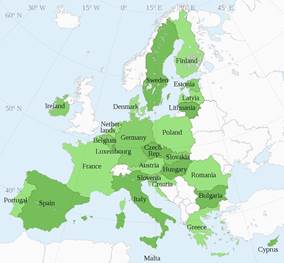Description

Copyright infringement is not intended
Context:
- The EU reached an agreement to ban 90% of Russian crude oil imports by the end of the year. The partial embargo exempts pipeline oil in order to bypass Hungary’s objections to the ban.
- The exemption for pipeline imports was made on the logic that landlocked countries (Hungary, Czech Republic and Slovakia) that are heavily dependent on Russian pipeline oil do not have a ready option to switch to alternative sources in the absence of ports.
- The announcement of the EU ban caused an immediate surge in oil prices. In this context, with Russia reportedly offering discounts of $30-35 per barrel, India has found it convenient to make the most of the cheap Russian crude.
What was the rationale behind such a move?
- The Russian economy is heavily dependent on energy exports, with the EU paying billions of dollars every month to Russia for its crude and refined products.
- The EU wants to block this massive revenue inflow which is akin to Europeans bankrolling Russia’s war.
- The EU has been attempting, ever since the Ukraine invasion, to build consensus on ways to hurt Russia economically so that it is forced to roll back its military offensive. The most obvious route was to stop buying Russian energy, which isn’t easy given European households’ dependence on Russian oil and gas.
- However, in the context of two long term EU objectives — reducing fossil fuel dependence in favour of renewables, and eliminating dependence on Russian energy for greater strategic autonomy and energy security — member states agreed to make a start by phasing out Russian oil.
Are there other elements in the sixth package of sanctions?
- Apart from the oil embargo, the sixth package of sanctions also contains other tough measures against Russia.
- These include cutting off Sberbank, Russia’s largest bank that holds one-third of Russian banking assets, from the SWIFT messaging system; a ban on three Russian-owned broadcasting networks from the EU; sanctions on individuals responsible for war crimes in Ukraine; and a ban on EU-based firms offering insurance, financing, brokering or any other technical services related to the transport of oil to Russian ships — a measure aimed at curbing Russia’s ability to divert its oil to non-EU destinations.
How will the sanctions affect Russia?
- Analysts calculate that a two-thirds cut in Europe’s imports of Russian oil would mean a reduction of 1.2-1.5 million barrels a day in oil, and one million barrels in refined products, which might cause Russia an annual loss in revenue of $10 billion.
- Given Russia’s limited storage infrastructure, the cutback in demand would force Russia to find other markets. Since that won’t be easy, Russia might have to cut production by 20-30%, say industry experts.
- So far, Asian importers, especially India, have absorbed some of the excess inventory at discounted prices. But it remains unclear if the embargo would have any impact on Russian military operations in Ukraine.
How will the sanctions affect Europe?
- It is likely to further fuel inflation in Europe, where many countries are already facing a cost-of-living crisis. EU leaders have tried to balance contradictory pressures — of having to take decisive action against a military aggressor on European soil, but without causing too much pain to its citizens.
- But European lifestyles have tended to take cheap Russian energy for granted, and if inflation peaks further, the EU runs the risk of losing public support for harsh sanctions.
What about import of Russian gas?
- Compared to Russian oil, Europe’s dependence on Russian gas is much greater, and this embargo leaves the import of Russian gas — which accounts of 40% of Europe’s natural gas imports — untouched. In other words, Europe will continue to pay Russia for gas imports.
- But since crude is more expensive than natural gas, the oil ban is expected to hurt Russian revenues.
How has India responded to these developments?
- India ramped up purchases of Russian crude at discounted prices in the months following the Russian invasion, and this policy is expected to continue.
- The announcement of the EU ban caused an immediate surge in oil prices, and as Europe seeks alternate sources – from West Asia, Africa and elsewhere — for its oil needs, prices are expected to stay high.
- In this context, with Russia reportedly offering discounts of $30-35 per barrel, India has found it convenient to make the most of the cheap Russian crude on offer.
About EU:
- European Union is an international organisation consisting of European Countries, which was formed in 1993.
- It came into force after the signing of the Maastricht Treaty by 28 countries.
- The Maastricht Treaty is also known as the Treaty of the European Union (TEU).
- Members of the EU: 27. UK made an exit from the EU on 31st January 2020
- European Union has 24 official languages
- Euro is the official currency for 19 of the 27 EU member countries
- The objectives of forming the European Union are:
- To increase political cooperation
- To enhance economic integration by creating a single currency the EURO.
- Unified security and foreign policy
- Common citizenship Rights
- Enhanced cooperation in the areas of judiciary, immigration and asylum.
- European Union was awarded the Nobel Prize for Peace in 2012.

Copyright infringement is not intended
https://epaper.thehindu.com/Home/ShareArticle?OrgId=GTU9SJ8CS.1&imageview=0
1.png)















